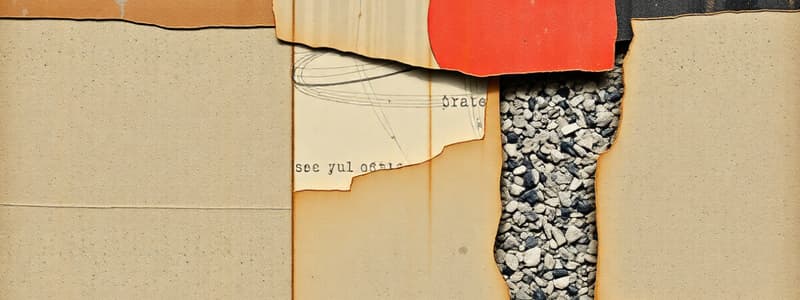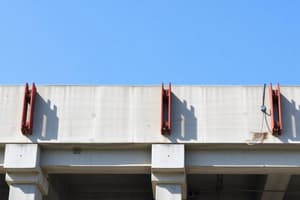Podcast
Questions and Answers
What is the primary ingredient in reinforced concrete?
What is the primary ingredient in reinforced concrete?
- Portland cement (correct)
- Fine aggregate
- Coarse aggregate
- Admixture
Which term refers specifically to particles that are ¼" or smaller in size?
Which term refers specifically to particles that are ¼" or smaller in size?
- Admixtures
- Coarse aggregates
- Cement
- Fine aggregates (correct)
Which of the following is NOT a class of chemical admixtures?
Which of the following is NOT a class of chemical admixtures?
- Retarding
- Air-entraining
- Hydrophobic (correct)
- Water-reducing
What is the typical range in diameter for coarse aggregates?
What is the typical range in diameter for coarse aggregates?
Which type of cement is the most common in general use for concrete production?
Which type of cement is the most common in general use for concrete production?
Which of the following correctly describes fine aggregates?
Which of the following correctly describes fine aggregates?
What is the role of admixtures in concrete?
What is the role of admixtures in concrete?
What is the proper terminology for a sidewalk made of concrete?
What is the proper terminology for a sidewalk made of concrete?
What is the main purpose of using admixtures in concrete construction?
What is the main purpose of using admixtures in concrete construction?
What notable characteristic is associated with prestressed concrete?
What notable characteristic is associated with prestressed concrete?
According to the specifications, what is the unit weight of concrete?
According to the specifications, what is the unit weight of concrete?
What is a typical characteristic of the tensile strength of concrete?
What is a typical characteristic of the tensile strength of concrete?
What is the relationship between allowable compressive stress and specified compressive stress in concrete?
What is the relationship between allowable compressive stress and specified compressive stress in concrete?
What is the modulus of elasticity for normal weight concrete as derived from specified compressive stress?
What is the modulus of elasticity for normal weight concrete as derived from specified compressive stress?
What is the lowest yield stress grade mentioned for reinforced steel bars?
What is the lowest yield stress grade mentioned for reinforced steel bars?
What is the primary function of tendons in prestressed concrete?
What is the primary function of tendons in prestressed concrete?
Flashcards are hidden until you start studying
Study Notes
Reinforced Concrete
- A composite material composed of Portland cement, fine and coarse aggregates, water, and steel reinforcement. Designed to work together, with the steel resisting tensile forces and the concrete handling compressive forces.
- Concrete is the most commonly used construction material in the world.
- Portland cement is a generic term for the type of cement used in all concrete.
Aggregates
- Fine aggregates are particles smaller than ¼", generally sand or crushed stone.
- Coarse aggregates are particles larger than 0.19", ranging from 3/8" to 1.5" in diameter, typically gravel or crushed stone.
Admixtures
- Chemicals added to concrete before or during mixing.
- Classes of admixtures include air-entraining, water-reducing, retarding, accelerating, and plasticizers (superplasticizers).
- Admixtures can modify the properties of hardened concrete, such as:
- retarding heat generation during early hardening,
- accelerating the rate of strength development,
- increasing the strength of concrete or mortar (compressive, tensile, or flexural).
Prestressed Concrete
- A form of concrete in which high-strength tendons (steel cables) are tensioned within or adjacent to the concrete.
- This tensioning creates a compressive force within the concrete, improving its performance in service.
Concrete Properties
- Unit Weight: 23.60 kN/m^3 (NSCP 2015)
- Tensile Strength: Poor
- Compressive Strength: Good
- fc' (specified compressive stress): 17, 21, 25, 28, 32, 35 MPa (NSCP 2015)
- fc (allowable compressive stress):
- 0.85fc' (Strength Design Method, SDM - NSCP 2015)
- 0.45fc' (Alternate Design Method, ADM - NSCP 2015)
- Modulus of Elasticity:
- E
c= 4700 [$\sqrt{fc'}$]{.math.inline} for normal weight concrete (NSCP 2015)
- E
Reinforced Steel Bars (Rebars)
- Designation:
- ASTM STD.DES.PHIL.STD.DES.
-
3 = 10 mm ϕ
-
4 = 12 mm ϕ
-
5 = 16 mm ϕ
-
6 = 20 mm ϕ
-
8 = 25 mm ϕ
-
9 = 28 mm ϕ
-
10 = 32 mm ϕ
-
11 = 36 mm ϕ
-
- ASTM STD.DES.PHIL.STD.DES.
- Compressive Strength: Good
- Tensile Strength: Good
- fy (yield stress):
- 230 MPa - structural grade (white)
- 280 MPa and 345 MPa - intermediate grade (yellow)
- 420 MPa - high grade (green)
- fy (yield stress):
- Modulus of Elasticity:
- Es = 200 000 MPa (NSCP 2015)
Studying That Suits You
Use AI to generate personalized quizzes and flashcards to suit your learning preferences.




